Key takeaways:
- Restorative justice emphasizes healing over punishment, fostering community connection and understanding through open dialogue.
- Anti-war activism highlights the personal impact of conflict, encouraging empathy and critical conversations about the consequences of military actions.
- Personal motivations for activism are driven by a sense of responsibility and interconnectedness, aiming to amplify the voices of those affected by war.
- Applying restorative justice in activism transforms conflict resolutions, focusing on dialogue and compassion instead of dissent and opposition.
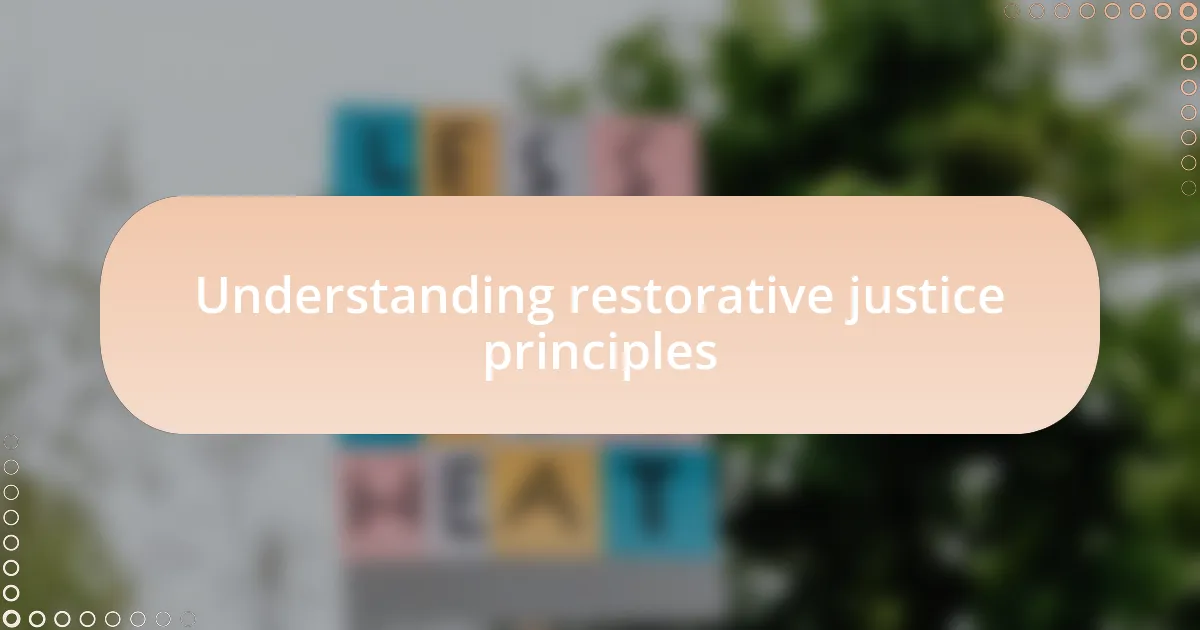
Understanding restorative justice principles
Restorative justice principles focus on healing rather than punishment. I remember a discussion I had with a group of fellow activists about this. We shared stories about how traditional punitive systems often leave victims feeling alienated, while restorative practices foster a sense of community healing.
Think about it: what would it take for us to shift our perspective from retribution to reconciliation? In my experience, engaging in dialogue with those who have caused harm opens pathways for understanding and empathy. It’s a transformative process where everyone involved—not just victims, but offenders as well—can find a way to repair and restore relationships.
At its core, restorative justice invites us to reflect on our shared humanity. I found it deeply moving to witness participants in a restorative circle, some of whom had never previously spoken, forging connections through vulnerability. It’s a reminder that every conflict has the potential to cultivate growth and understanding, shifting the narrative from division to unity.
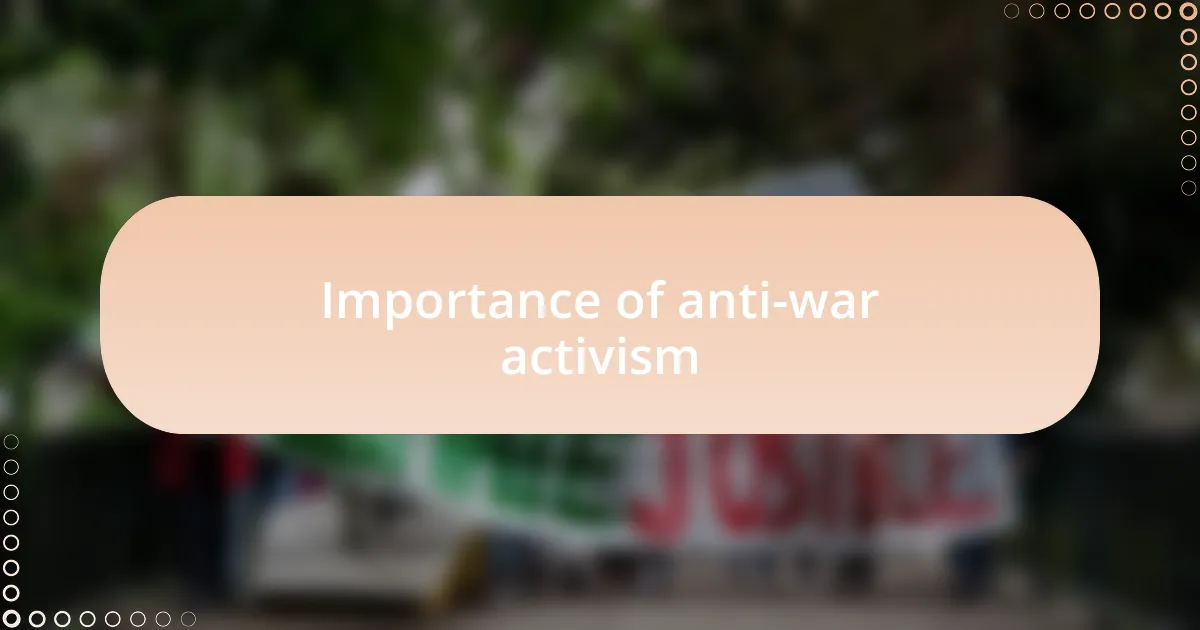
Importance of anti-war activism
Activism against war serves a crucial role in amplifying the voices of those who are most affected by conflict. I vividly recall attending a rally where a mother, who had lost her son to a senseless conflict, shared her heart-wrenching story. Her raw emotion illustrated a stark truth: war impacts real people—our neighbors, families, and friends—and it is vital for us to recognize these human stories to foster a culture that values peace over violence.
Moreover, anti-war activism encourages critical dialogue about the ramifications of military interventions. I often think about how easy it is to get lost in political rhetoric, but engaging in conversations with those who oppose war has opened my eyes to the broader consequences. By sharing our perspectives and experiences, we challenge the status quo, creating a space for collective healing and reflection on how peace can be more than just the absence of war.
Furthermore, participating in anti-war movements helps to reshape societal norms around conflict resolution. During one of my experiences volunteering with a local peace organization, I witnessed firsthand how education and awareness can mobilize communities towards nonviolent solutions. It made me realize that activism is not just about protest; it’s about actively cultivating a mindset that seeks understanding and collaboration, shifting our societal narrative from one of aggression to one of empathy and restoration.
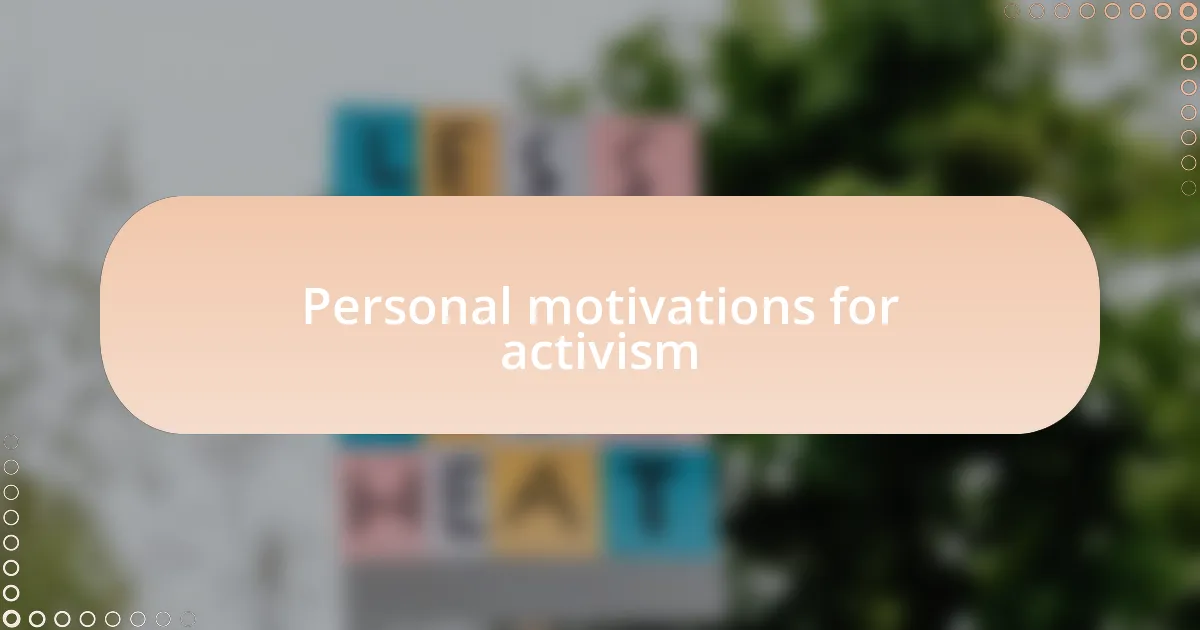
Personal motivations for activism
When I reflect on my motivations for activism, I often think about the deep sense of responsibility that drives me. It was a quiet evening, and I was reading a report on children displaced by war. The image of a young child staring blankly into the distance haunted me. How could I turn a blind eye to their suffering? This compulsion to act stems from an acknowledgment that each person deserves a voice, and I want to help amplify those silenced by the horrors of conflict.
Another driving force for my activism is the realization that we’re all interconnected. A few years ago, I had a conversation with a friend who had survived a war-torn childhood. Hearing her experiences opened my eyes to how our actions—or inactions—here directly affect lives thousands of miles away. It made me wonder: if not me, then who? That lingering question continues to fuel my involvement in anti-war efforts.
I have also come to understand that personal growth goes hand in hand with activism. Each protest, every community meeting, and every heartfelt conversation has taught me something new. One powerful moment was when I listened to a veteran describe the toll of war from a soldier’s perspective. It was a stark reminder that activism is not just about opposing war; it’s also about understanding the complexity of human experiences and fostering healing for all those affected, including those who serve. This journey allows me not only to advocate for peace but also to evolve as a compassionate human being.
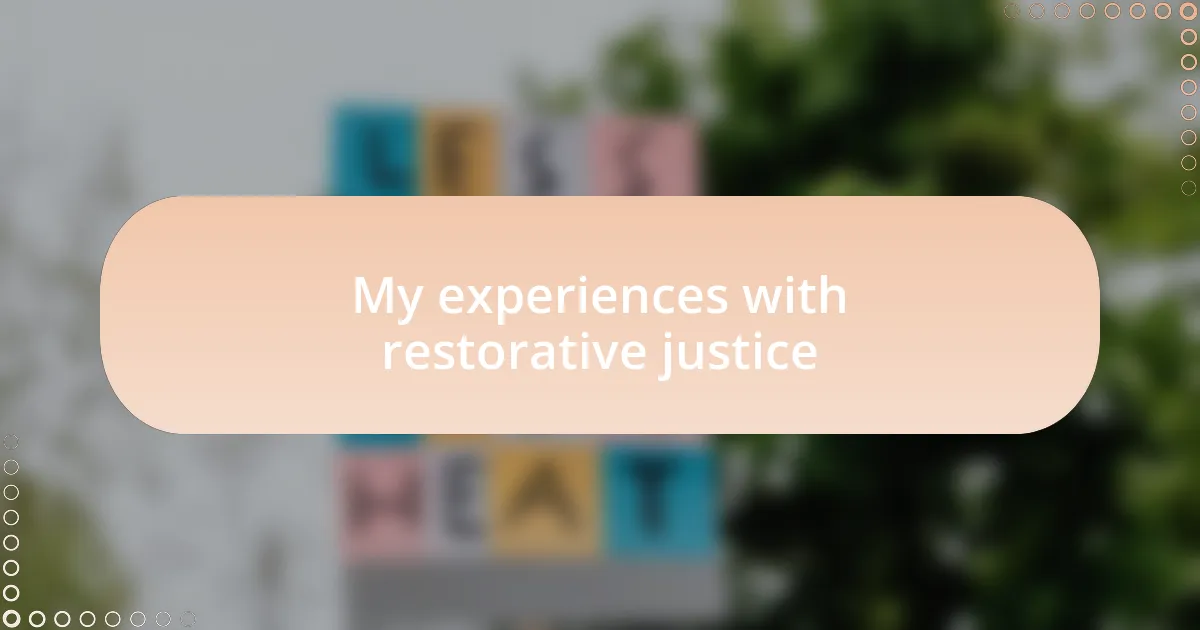
My experiences with restorative justice
My experiences with restorative justice have profoundly shaped my perspective on healing and accountability. I remember attending a circle discussion where victims and offenders shared their stories. It was eye-opening to witness how vulnerable people could be when discussing their pain. I found myself thinking, “What if all conflicts could be resolved this way?” The genuine dialogue held within that circle sparked a glimmer of hope in my heart.
One particular instance stands out for me. I facilitated a restorative justice session between a young man involved in a petty theft and the shop owner he affected. The initial tension was palpable, but as they spoke, I noticed something beautiful unfolding: compassion replaced anger. It struck me how restorative practices not only allow for reconciliation but also humanize individuals, transforming them from labels to real people with their own narratives.
Reflecting on these experiences, I find myself continually drawn to the potential of restorative justice in anti-war activism. How might these principles of dialogue and understanding be scaled to address broader conflicts? The more I engage with this work, the more I realize that healing is a collective process, and it begins with open communication. This realization motivates me to advocate for restorative justice as a healing tool both for individuals and communities torn apart by war.
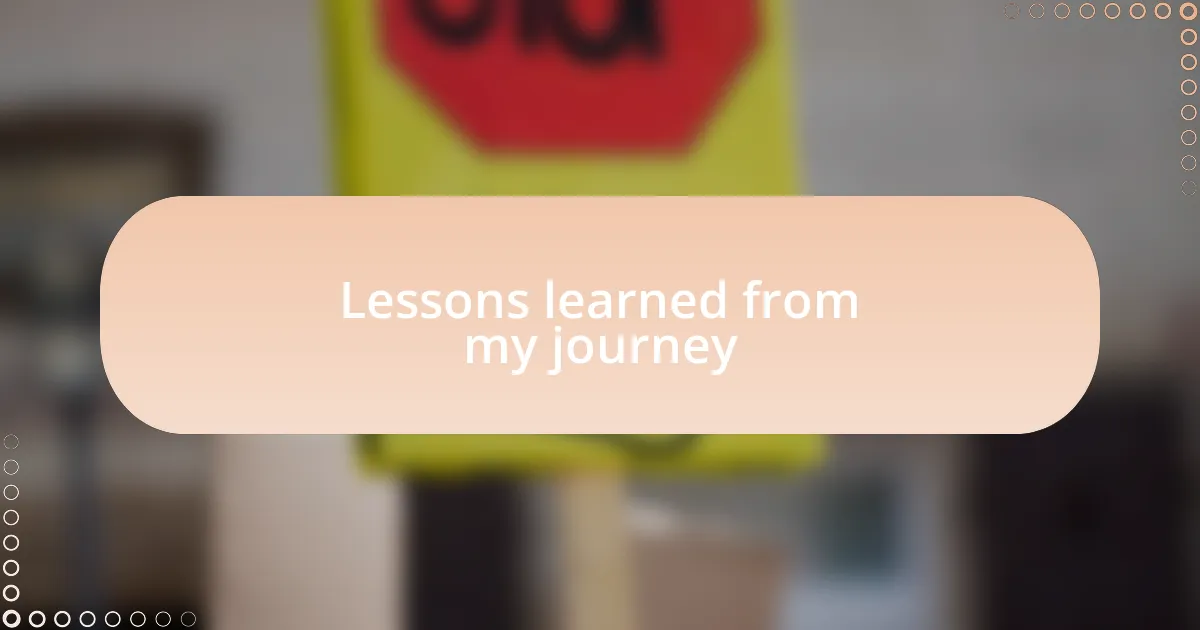
Lessons learned from my journey
Throughout my journey, I’ve learned that vulnerability is a powerful catalyst for change. During one session, a participant expressed deep regret for their actions, and it reminded me how important it is to create safe spaces for honest expression. I began to ask myself, “How often do we allow ourselves to be this open in everyday life?” The answer was stark—most of us shy away from such rawness, yet it is essential for genuine connection.
An unforgettable lesson emerged from a specific moment when I witnessed reconciliation unfold between a father and a son estranged by a past conflict. Their tears spoke volumes as they shared their wounds. This experience taught me that acknowledgment of pain can forge unexpected pathways to healing. It left me wondering, can we apply this understanding to larger conflicts?
Moreover, I realized that forgiveness does not equate to forgetting. I once facilitated a discussion around this concept, and it dawned on me that many attendees grappled with the tension between holding onto pain and moving forward. I felt their struggle resonating within me. It has become clear that embracing this complexity is crucial for fostering true peace, especially in contexts impacted by war.
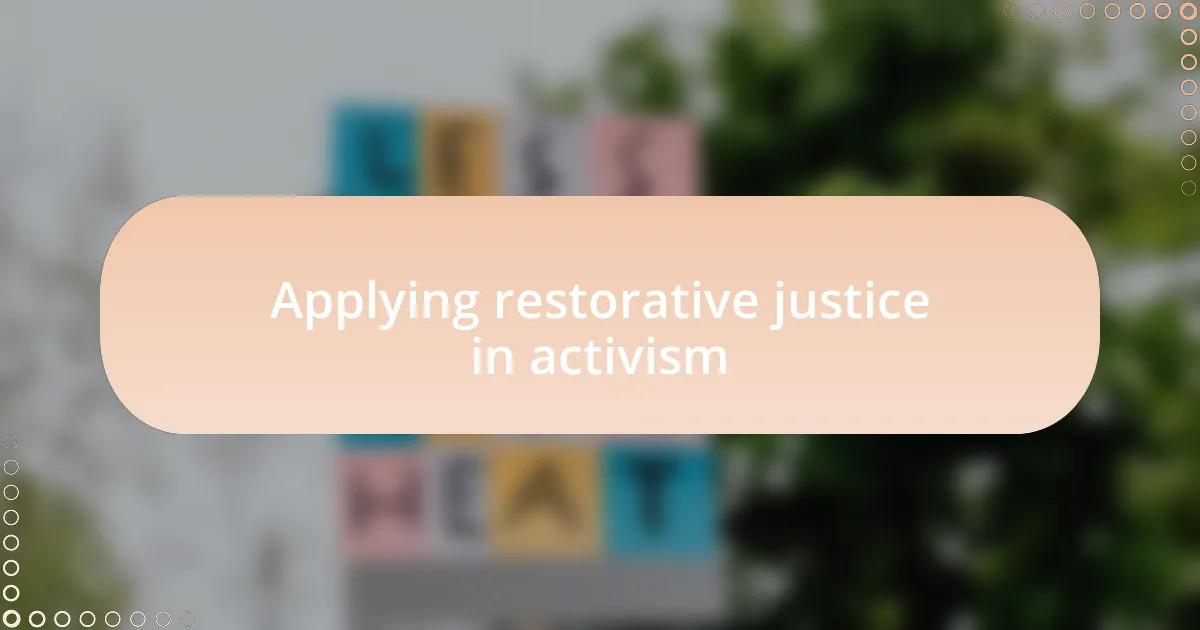
Applying restorative justice in activism
Applying restorative justice principles in activism offers a way to confront conflict differently. I once joined a local peace rally where tensions were high, and I noticed that rather than shouting slogans, some activists gathered in circles to share their stories. In that moment, I reflected on how storytelling can transform our approach to activism. Isn’t it fascinating how personal narratives can bridge divides and foster understanding?
During one particular workshop I attended, participants who had protested against the same war shared their contrasting experiences. As emotions unfolded, I felt a shift in my perspective. Listening to their views changed my understanding of the conflict and its human impact. This approach made me realize that we could channel our energy not just into resistance, but into creating compassion, even toward those we disagree with.
After witnessing these interactions, I began to see activism not merely as an act of dissent, but as an opportunity for dialogue and restoration. We often think of activism as a battle of ideas, but could it also be a journey of healing? By inviting open conversations and focusing on accountability rather than punishment, we can cultivate a culture of empathy that transcends mere opposition.